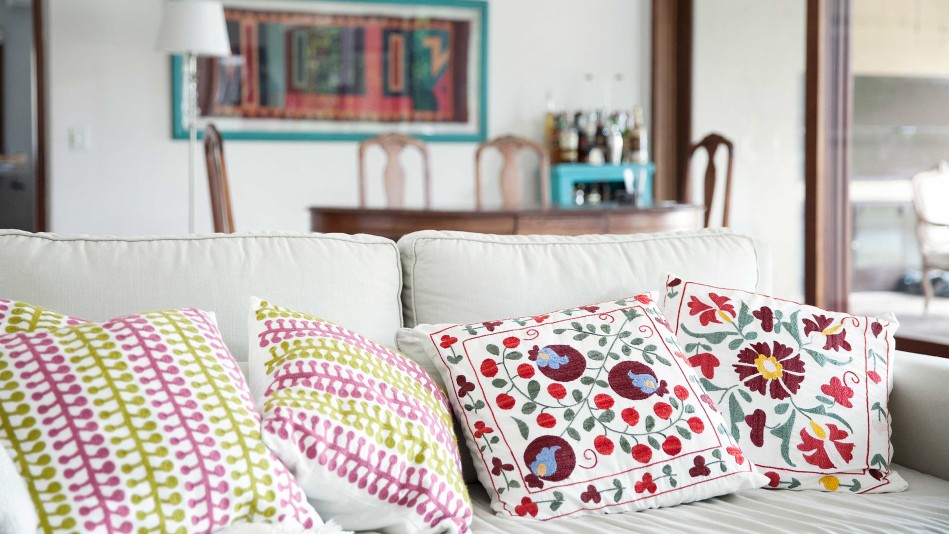What Makes a Home?
How a little creative thinking can turn any space into a sanctuary.

Photo: PhotoAlto/Sigrid Olsson
What makes a house—or an apartment, a condo, a cabin or even a yurt—a home? Everywhere we look, there's another expert telling us the answer lies in something we don't have, from fancy bed linens to an interior decorator. The feeling of being "at home" can't be bought, however, because it comes from an intimate relationship between us and our most personal place. Like other love affairs, this one shapes us just as we shape it. We lavish not only money but also our time and creativity on our homes, and in return, they give us comfort, pleasure and sanctuary.
We worry a lot about how our homes look, but how they make us feel, emotionally and physically, is far more important. That costly renovation or those silky sheets matter less than whether our living spaces nourish who we are, buffer us from stress, and provide opportunities both for privacy and for socializing with family and friends. From a rented studio to a sprawling McMansion, any home can become the foundation for a better life—all for the price of fresh thinking.
We already know that five minutes in the garden makes us feel like another person, and that flowers and candles turn a meal into a feast. Other home remedies require an individual touch. Does every room hold something—a picture, a quilt, a bit of china—that you love? That helps you count your blessings? Research shows that, particularly when life is difficult, being near things that remind us of better times helps restore us.
We can also make our homes more soothing by feathering a personal nest. Those piles of little pillows on beds and rows of bath oils by the tub mark two of our best refuges. Primate studies suggest that this desire for a special haven is no luxury but a deep biological need. When monkeys need a respite, they seek their secure base, which lowers their levels of stress hormones. This makes sense, considering that we primates begin our lives nested safely with our mothers.
Perhaps the most surprising way to get more from home is to pinpoint the activities that really make us happy there. Feeling "stuck at home" often signals that we settle for passive, unsatisfying time-killers instead of going for gratification, whether that's reading a challenging novel, cleaning out a closet, or taking out the paints and easel.
Finally, we can let the sun shine in. A third of us suffer from mood or sleep problems related to inadequate light. Freed from gloomy drapes, we also benefit from views of the backyard, a skyscape, or even a window box. After applying some fresh thought—and perhaps a little elbow grease—we can sit back, put our feet up, and receive our home's new gifts.
We worry a lot about how our homes look, but how they make us feel, emotionally and physically, is far more important. That costly renovation or those silky sheets matter less than whether our living spaces nourish who we are, buffer us from stress, and provide opportunities both for privacy and for socializing with family and friends. From a rented studio to a sprawling McMansion, any home can become the foundation for a better life—all for the price of fresh thinking.
We already know that five minutes in the garden makes us feel like another person, and that flowers and candles turn a meal into a feast. Other home remedies require an individual touch. Does every room hold something—a picture, a quilt, a bit of china—that you love? That helps you count your blessings? Research shows that, particularly when life is difficult, being near things that remind us of better times helps restore us.
We can also make our homes more soothing by feathering a personal nest. Those piles of little pillows on beds and rows of bath oils by the tub mark two of our best refuges. Primate studies suggest that this desire for a special haven is no luxury but a deep biological need. When monkeys need a respite, they seek their secure base, which lowers their levels of stress hormones. This makes sense, considering that we primates begin our lives nested safely with our mothers.
Perhaps the most surprising way to get more from home is to pinpoint the activities that really make us happy there. Feeling "stuck at home" often signals that we settle for passive, unsatisfying time-killers instead of going for gratification, whether that's reading a challenging novel, cleaning out a closet, or taking out the paints and easel.
Finally, we can let the sun shine in. A third of us suffer from mood or sleep problems related to inadequate light. Freed from gloomy drapes, we also benefit from views of the backyard, a skyscape, or even a window box. After applying some fresh thought—and perhaps a little elbow grease—we can sit back, put our feet up, and receive our home's new gifts.



